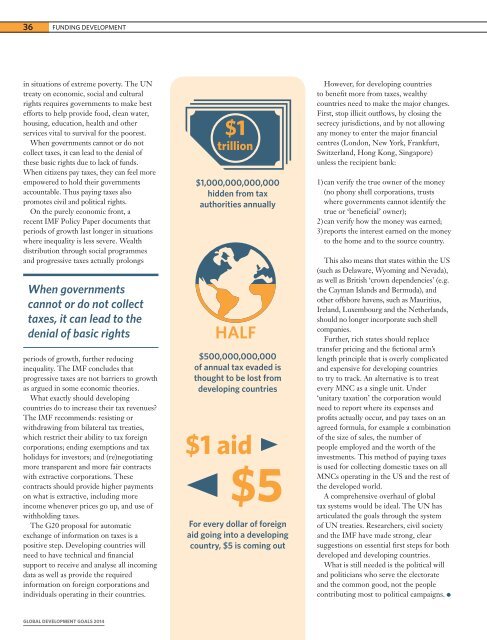FAMBB
FAMBB
FAMBB
Create successful ePaper yourself
Turn your PDF publications into a flip-book with our unique Google optimized e-Paper software.
36 FUNDING DEVELOPMENTin situations of extreme poverty. The UNtreaty on economic, social and culturalrights requires governments to make bestefforts to help provide food, clean water,housing, education, health and otherservices vital to survival for the poorest.When governments cannot or do notcollect taxes, it can lead to the denial ofthese basic rights due to lack of funds.When citizens pay taxes, they can feel moreempowered to hold their governmentsaccountable. Thus paying taxes alsopromotes civil and political rights.On the purely economic front, arecent IMF Policy Paper documents thatperiods of growth last longer in situationswhere inequality is less severe. Wealthdistribution through social programmesand progressive taxes actually prolongsWhen governmentscannot or do not collecttaxes, it can lead to thedenial of basic rightsperiods of growth, further reducinginequality. The IMF concludes thatprogressive taxes are not barriers to growthas argued in some economic theories.What exactly should developingcountries do to increase their tax revenues?The IMF recommends: resisting orwithdrawing from bilateral tax treaties,which restrict their ability to tax foreigncorporations; ending exemptions and taxholidays for investors; and (re)negotiatingmore transparent and more fair contractswith extractive corporations. Thesecontracts should provide higher paymentson what is extractive, including moreincome whenever prices go up, and use ofwithholding taxes.The G20 proposal for automaticexchange of information on taxes is apositive step. Developing countries willneed to have technical and financialsupport to receive and analyse all incomingdata as well as provide the requiredinformation on foreign corporations andindividuals operating in their countries.$1trillion$1,000,000,000,000hidden from taxauthorities annuallyHALF$500,000,000,000of annual tax evaded isthought to be lost fromdeveloping countries$1 aid$5For every dollar of foreignaid going into a developingcountry, $5 is coming outHowever, for developing countriesto benefit more from taxes, wealthycountries need to make the major changes.First, stop illicit outflows, by closing thesecrecy jurisdictions, and by not allowingany money to enter the major financialcentres (London, New York, Frankfurt,Switzerland, Hong Kong, Singapore)unless the recipient bank:1) can verify the true owner of the money(no phony shell corporations, trustswhere governments cannot identify thetrue or ‘beneficial’ owner);2) can verify how the money was earned;3) reports the interest earned on the moneyto the home and to the source country.This also means that states within the US(such as Delaware, Wyoming and Nevada),as well as British ‘crown dependencies’ (e.g.the Cayman Islands and Bermuda), andother offshore havens, such as Mauritius,Ireland, Luxembourg and the Netherlands,should no longer incorporate such shellcompanies.Further, rich states should replacetransfer pricing and the fictional arm’slength principle that is overly complicatedand expensive for developing countriesto try to track. An alternative is to treatevery MNC as a single unit. Under‘unitary taxation’ the corporation wouldneed to report where its expenses andprofits actually occur, and pay taxes on anagreed formula, for example a combinationof the size of sales, the number ofpeople employed and the worth of theinvestments. This method of paying taxesis used for collecting domestic taxes on allMNCs operating in the US and the rest ofthe developed world.A comprehensive overhaul of globaltax systems would be ideal. The UN hasarticulated the goals through the systemof UN treaties. Researchers, civil societyand the IMF have made strong, clearsuggestions on essential first steps for bothdeveloped and developing countries.What is still needed is the political willand politicians who serve the electorateand the common good, not the peoplecontributing most to political campaigns.GLOBAL DEVELOPMENT GOALS 2014


